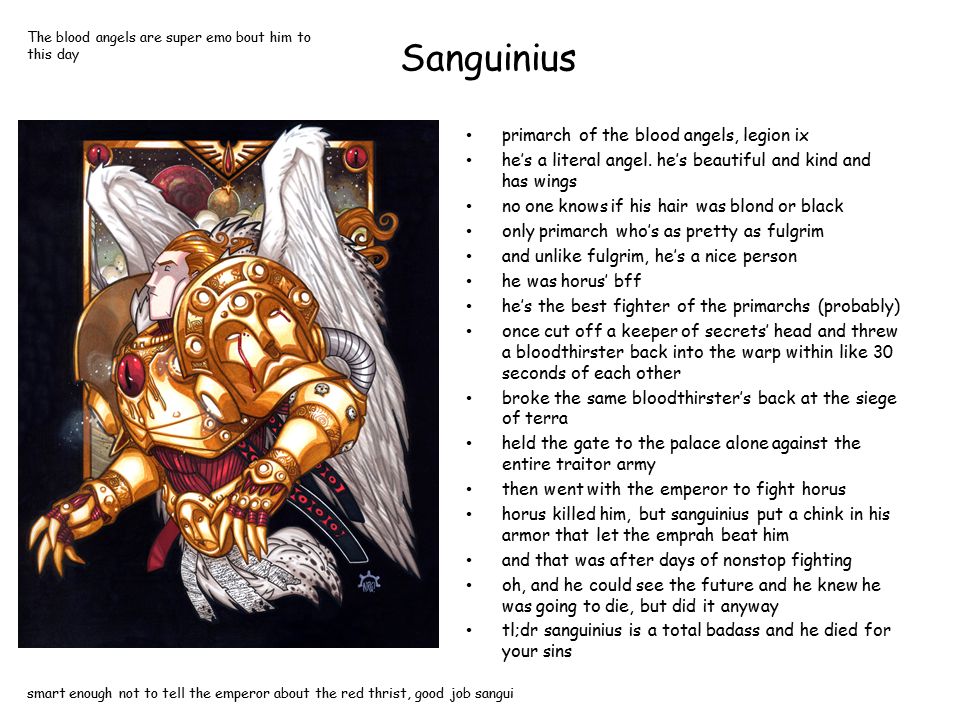Well here we are, finally at the very end of the Primarch series so far. I say “so far,” because I sadly hold out hope that they will finish it with Horus Lupercal. I know it’s been two years since Sanguinius: The Great Angel released. Let me have this tiny hope.
We knew Sanguinius would be near the end since the Final Battle™ is between him and Horus. But what can Chris Wraight tell us about the Angel that we didn’t already know? We know about his great friendship with Horus. We know about the Red Thirst. What new facet can we learn about Sanguinius that we haven’t already seen?
Well, the answer is that there isn’t. Instead, Wraight wrote this story from the point of view of a remembrancer who only knew of the winged primarch from vids and other forms of propaganda. This particular remembrancer was already on thin ice for writing about the “truth” of the Imperial Creed and pushing a different narrative than the Administratum on Terra would like. And yet Sanguinius asked for him to chronicle the Blood Angels’ deeds during the Great Crusade upon the recommendation of an artist remembrancer.
So what happens when a chronicler known for reporting the ugly truth receives unfiltered access to the Blood Angels? If you guessed “nothing good,” ding ding ding, award yourself a cookie.

Those Who Don’t Know History…
In American history, the Vietnam War was incredibly pivotal in American culture (even though it literally had nothing to do with us and wasn’t even fought on American soil) for one major reason: it was the first time reporters were allowed ON the battlefield. For the first time, Americans saw the raw brutalities of war on TV, completely unfiltered. They saw what the soldiers went through, saw actual fighting, witnessed executions, and even saw reporters killed in action while photographing or filming the atrocities.
Even in today’s wars, reporters aren’t allowed complete unfiltered access to film everything. And even if they did, the FCC prevents news stations from showing graphic scenes. There will never be another reporting travesty like the Vietnam War. Apparently that lesson wasn’t taught 29,000 years later, because if it was, the Blood Angels NEVER would have allowed Kautenya on the actual battleground.
Not even Horus allowed the remembrancers to witness the horrors of war. The one time he did, it was to show them Istvaan III right before he killed them all. Fulgrim only allowed the remembrancers onto Laer after the Emperor’s Children achieved compliance. How is it that the Traitor Legions knew that was a bad idea but the Blood Angels didn’t?
Because they let him experience battle first-hand, he does not have the same awe everyone else does of the greatness of the Angels. When Widera shows him her painting, he’s disappointed because it lauds Sanguinius and the Blood Angels. He has witnessed something completely different, something far more terrible. Even though her art is what the remembrancers should present to Terra back home, he can’t help but feel he needs to show the truth.
Blood and Murder
Readers of the Horus Heresy are familiar with the planet known as Murder, but that was only from the point of view of the Luna Wolves and the Emperor’s Children. Now we get it from the Blood Angels’ point of view, since they arrived on the planet first, but even then, it’s only from the eyes of the remembrancer, Kautenya.
While upon Murder, Kautenya witnesses not only the horrors of war, not unlike the reporters from the Vietnam War, but also the first signs that something is not right with the Blood Angels. Well, the first signs to him, I should emphasize. Despite warnings from Widera to let it go, he can’t help but search for the ugly truth. How does the saying go? The truth will set you free, but not until it is finished with you. The poet on the Vengeful Spirit learned that one the hard way. Kautenya learns his truth, and he even publishes his truth, but what was the cost at the end? Was it worth it? Perhaps he and Ignace reminisced about it together.
The question I have for Mr. Wraight is whether this book was truly about Sanguinius, the Great Angel, or was it really about the idea of the remembrancers cataloguing a gruesome war? But I suppose we could say the same about each and every one of these primarch novels, that they weren’t actually about the primarch on the cover. Perhaps the real lessons are the friends we made along the way reading these.
We’ll see if we get one about Horus. Otherwise, this marks the end for this series.
Fin.